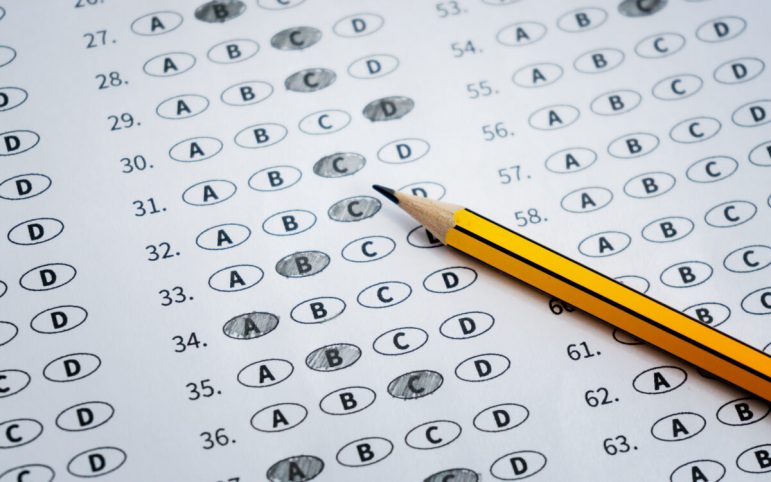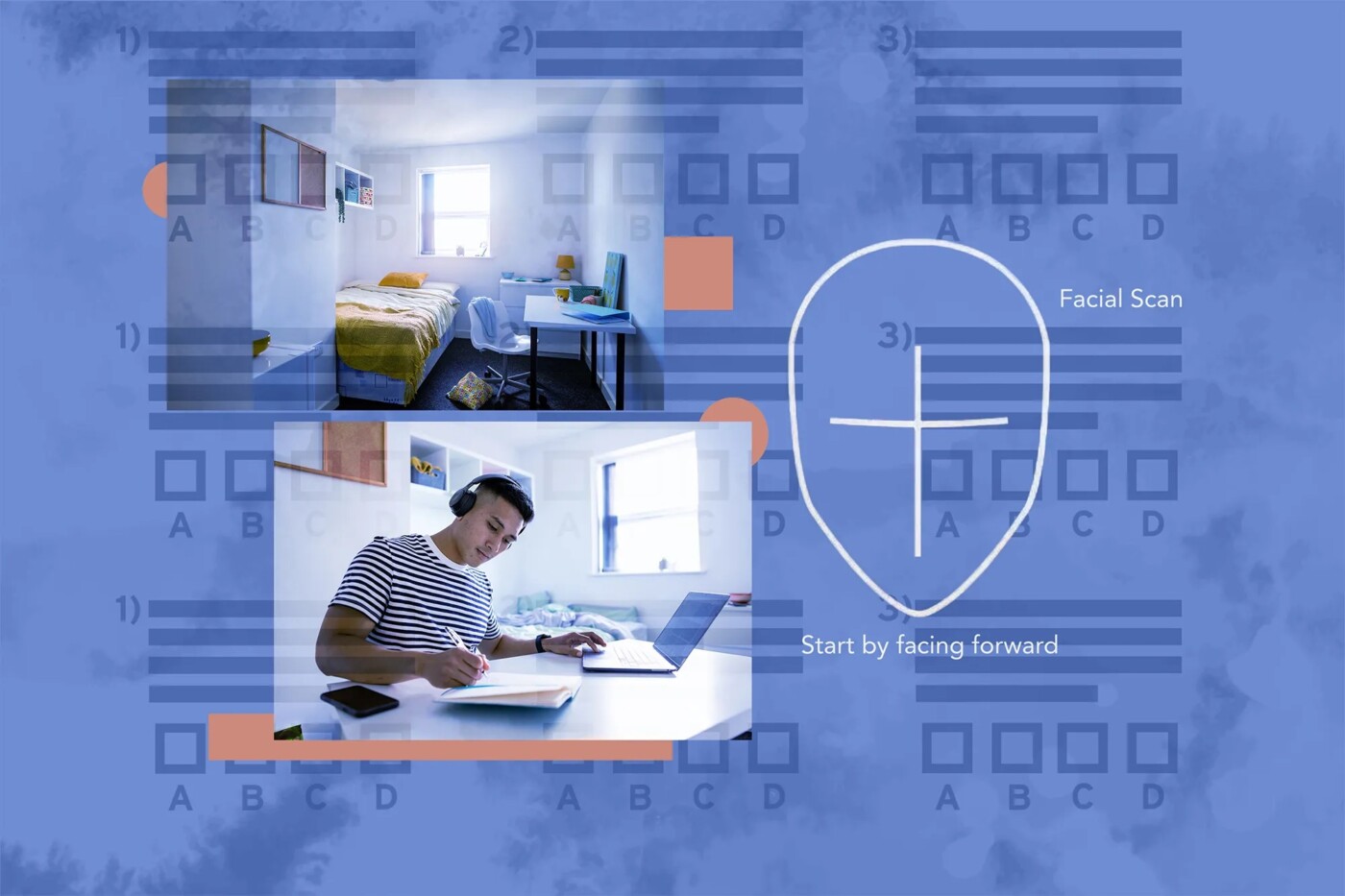Like many college students, Aaron Ogletree found himself attending classes from home in spring 2021. The Cleveland State sophomore took exams from his bedroom, the only place to find quiet and privacy in a home he shared with his mother and two siblings.
Less than two hours before he was scheduled to take one remote chemistry exam, according to court documents, Ogletree was shocked to receive an email informing him that he would be required to have his room remotely scanned by an online proctoring service. Remote proctoring software gained popularity during the pandemic as a way for universities to ensure that students sitting for exams miles from campus weren’t cheating. But Ogletree, who said he had confidential tax documents littered across his desk, viewed the room scan as an invasion of his privacy.
He complied, but later filed suit against Cleveland State, alleging the university violated his Fourth Amendment right to be free of “unreasonable searches and seizures.” In the first major legal test to the use of remote proctoring services in higher education, U.S. District Court Judge J. Philip Calabrese agreed in August that the room scanning was unconstitutional, stating that “Mr. Ogletree’s privacy interest in his home outweighs Cleveland State’s interests in scanning his room.”
Yet months later, as Cleveland State appeals the decision, some California schools are still using e-proctoring software that includes room scans.
San Diego State University, Cal Poly San Luis Obispo, Cal State San Marcos, Chico State University and the University of California at Berkeley all told the CalMatters College Journalism Network that at least some of their professors use such software. The state’s two public university systems lack a uniform policy on e-proctoring, so that’s likely not a complete list of campuses using the technology.
Students taking an exam with remote proctoring typically begin by showing an identification card, which the system uses to verify the student’s identity, and doing a webcam check. Certain e-proctoring services require students to show their room’s surroundings. They also often have to take a picture of the computer itself. During live proctoring, the instructor or a proctor can view the student while they take the exam via a video conference. At the same time, a lockdown browser monitors potential cheating on the computer itself.
Some systems, including Respondus, also offer a fully automated proctoring option, which allows students to record themselves taking the exam through their webcam. The instructor or a professional proctor is then able to view the recording afterwards, and the system flags any potential violations.
Privacy concerns
After spiking during the early days of the pandemic, the use of online proctoring services declined somewhat as faculty and students raised privacy concerns and universities began holding more in-person classes. But the technology has stuck around.
Respondus, one of the proctoring companies cited in the Cleveland State case, saw the number of professors using its online proctoring software decline by about 10% in 2022, but that still represents “significant growth” since before the pandemic, said COO Jodi Feeney.
“It’s clear that the pandemic accelerated adoption of e-proctoring, rather than it being a short-lived effect,” Feeney said.
Critics have called e-proctoring software innately racist, flawed, and an invasion of student privacy. The nonprofit digital rights advocacy organization Fight for the Future, which has led campaigns to ban e-proctoring, refers to the technology as “glorified spyware” and argues that it’s dangerous to give companies access to student’s personal information and biometric data such as face, voice and fingerprints.
“These companies, who were already kind of taking hold before the pandemic, really sunk their teeth in by convincing colleges and universities that ‘Your students are taking tests at home so you have to subject them to invasive surveillance, in order to maintain the academic integrity,’ ” said Fight for the Future’s director, Evan Greer.
E-proctoring companies argue concerns about surveillance are overblown since the data they collect is limited. While facial recognition is highly controversial in California – its use by law enforcement was banned until this year — both Respondus and a competitor, Proctorio, say their products use a simpler method, facial detection, which is able to determine whether or not a human face is present in the video, but cannot identify that person.
“When you take a picture with a Nikon camera and it places a green box around human faces on the preview screen, that is an anonymous process – it is not creating a biometric template and matching the image to another biometric template that has been stored in a database,” said Feeney.
Universities that have continued using e-proctoring say that it helps preserve the integrity of remote testing, allowing students to take exams in various locations, rather than just in the classroom.

Faculty opposition
Responding to increased concern by staff and students regarding student privacy, the California State University Academic Senate passed two resolutions in 2021 that urged faculty and Cal State campuses to avoid using facial recognition software and e-proctoring in their classrooms.
Academic Senate Vice Chairperson Thomas Norman, a professor at Cal State Dominguez Hills, said he grew concerned that e-proctoring software’s collection of student data was predatory.
“We are the product. But for this one, we’re actually paying for it,” Norman said. “This is more of a human rights issue. We’re doing away with a lot of privacy and we just thought that was inappropriate.”
Cal State previously held a system-wide license for the Respondus Monitor software, which allowed faculty on all its campuses to download the software for free. That license expired in July 2021 and was not renewed, said chancellor’s office spokesperson Amy Bentley-Smith.
However, Bentley-Smith added that “some campuses may have individual agreements with the vendor.”
One campus that does have an active contract with Respondus is Cal State San Marcos. Spokesperson Brian Hiro said that the software’s default setting includes room scanning and webcam monitoring, which means an “instructor would have to turn it off if they don’t want those functions.”
A small number of Cal State San Marcos’s programs use a different e-proctoring service, ProctorU, on a “pay-as-you-go” basis, he said. ProctorU services also require webcam use and their live proctoring does submit students to room scanning, according to their website.
Cal Poly San Luis Obispo also uses ProctorU for virtual math placement exams.
Many California schools don’t have a centralized policy on e-proctoring use, leaving the decision up to individual departments and professors. Cal State LA has not “embraced or implemented” e-proctoring, but individual faculty may request permission to use it.
Chico State encourages faculty to avoid using e-proctoring, said public information officer Sean Murphy.
“Because of concerns about privacy, racial discrimination, equity, and accessibility when it comes to exam proctoring platforms, the CSU Chancellor’s Office strongly encourages faculty to choose alternative assessments in lieu of proctoring software,” Murphy said in a statement to Cal Matters.
If a Chico State professor chooses to use e-proctoring, they must notify students in the course syllabus and description before the start of the semester. Additionally, “students must be able to opt-out of being proctored by software” and “faculty must be prepared to offer an alternative form of assessment,” Murphy said.
UC Berkeley follows a similar decentralized policy. The university originally halted most remote proctoring use, said spokesperson Janet Gilmore, but then established a pilot program in 2020 after the Electrical Engineering and Computer Science department raised concerns. The campus has since created guidelines for remote proctoring, Gilmore said, but noted that e-proctoring is “generally not used” on campus.
At San Diego State, the use of Respondus Monitor is only allowed “when specifically requested by individual faculty members, and faculty are only able to use e-proctoring software for their courses with approval from their Dean’s office,” according to a statement from the university.
This structural ambiguity, coupled with a lack of understanding among students regarding the sensitivity of their biometric information, can lead to dangerous and “chilling effects on students,” said Greer.
“We’re normalizing the practice of handing over our sensitive biometric information to our schools and most people just do not truly understand the potential risks associated with that,” Greer said.
“Meaningful consent means you have to really understand what you’re consenting to. And since most people don’t have an understanding of what it means to hand their biometric information over to a company, I don’t think that’s really meaningful consent.”
Unlike other California college campuses, Cal Poly Pomona has a strict policy against the use of e-proctoring “due to the concerns about privacy and equity,” a university spokesperson said.
And California’s Student Test Taker Privacy Protection Act, which went into effect Jan. 1, prohibits companies that provide proctoring services in educational settings to collect or use personal information outside of what is deemed necessary to provide the proctoring services.
Case under appeal
Cleveland State is currently appealing the federal court’s decision, which focused specifically on room scanning and did not address whether e-proctoring as a whole is permissible.
“The Fourth Amendment prohibits schools from conducting this virtual snooping. That’s what we argued to the court, and the court agreed,” Ogletree’s attorney, Matt Besser, told the CalMatters College Journalism Network. The ruling bars Cleveland State from requiring Ogletree to take tests with room scans; Besser is filing a motion to extend that ban to the rest of the university.
Cleveland State counters that room scanning should not be considered searches because they are limited in scope and not coerced. And in a statement Feb. 13, Respondus minimized the significance of the ruling. “This decision relied on a very fact-dependent inquiry and therefore we do not believe this is a landmark ruling relating to remote proctoring technologies,” the company wrote.
Many California faculty, however, remain skeptical of the technology. Norman, the Cal State Academic Senate vice chairperson, said professors can cut down on cheating by choosing creative assignments over typical exams, fostering a more personalized experience that makes students less likely to want to bend the rules.
“We deal with a lot of first-generation students and a lot of students coming back who have bad experiences or have imposter syndrome,” Norman said. “We want to have an honor code and just trust that it’s going to be you (taking the test).”
Norman also noted that in addition to online proctoring services, faculty use learning management systems such as Canvas and Blackboard that often have proctoring built into their software.
“We want to make sure that we’re looking over all of that so we don’t inadvertently, through a textbook, be subjecting our students to agreeing to things they might not want to agree to in respect to privacy,” Norman said.
—
Luna is a fellow with the CalMatters College Journalism Network, a collaboration between CalMatters and student journalists from across California. This story and other higher education coverage are supported by the College Futures Foundation.
